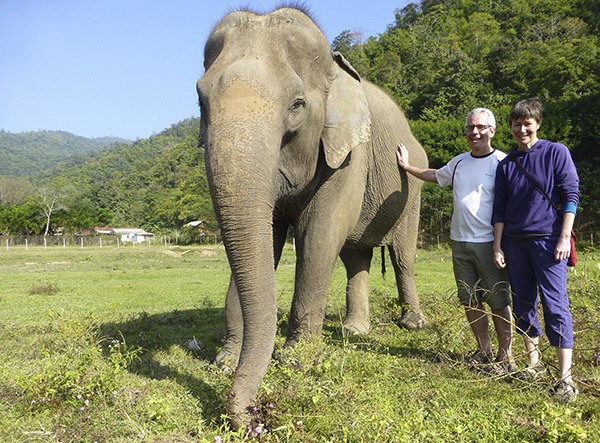The islanders travel to Asia several times a year to volunteer at a 150-acre sanctuary that is home to several hundred dogs and 41 elephants. The nonprofit was originally launched to provide a loving environment for elephants rescued from abusive work conditions. Harachi says that many Americans don’t understand what the animals endure overseas, and she hopes to educate and inform the public.
“Any time you see an elephant in the street or available for rides – it’s most likely been beaten,” Harachi said.
After devastating floods in 2011, volunteers transported more than 500 dogs from Bangkok to the sanctuary. Most of them were injured and many were near death. Yoffa and Harachi helped care for the dogs and decided to fly back with B.K., a purebred Kintamani Bali Dog, two years ago. She now happily resides on Orcas with her packmate Joey, an Australian Shepherd.
Harachi, who is a professor at the University of Washington, travels to Cambodia up to four times a year to do social work. Yoffa works for a software company and has a flexible work schedule, so he is often able to accompany her. During their last trip this past December, in addition to their usual tasks of feeding and bathing the elephants, they helped rehabilitate injured animals using hydrotherapy and a hand-held laser device for repairing tissue that had been donated by the manufacturer.

When a 56-year-old elephant named Mae Keow shattered ligaments in her leg, Harachi was asked to help administer laser treatments. Unfortunately, Mae Keow’s injuries were too severe and prevented her from being able to stand on her own, a crucial need for elephants, and she was ultimately euthanized. But Yoffa and Harachi saw the laser help others’ ailments – from arthritis in elephants to flesh wounds in dogs. The FDA-approved device, which has recently made its way into veterinary care, pulses red and blue light at different frequencies. It accelerates tissue healing, reduces inflammation, decreases pain and can penetrate down to the bone to repair damage.
The couple wanted to raise money for purchasing another laser, and when the manufacturer agreed to throw in a second unit for free, they started an online campaign. They’ve raised 70 percent of the goal but still need to bring in $1,800. Donations can be made online at http://tinyurl.com/lojwptg or mailed to PO Box 1599, Eastsound, WA 98245.
Yoffa and Harachi are returning to Thailand in March for another volunteering stint. They hope to purchase the laser in time for their trip.
Yoffa says the fundraising has given him the incentive to share information about the sanctuary and elephant tourism. He will give a presentation on Sunday, Feb. 8 at 2 p.m. at Island Hoppin’ Brewery. All ages are welcome.
“We hope that traditional elephant tourism can be taken off people’s bucket lists,” Yoffa said.
Elephants in Asia have a history of being used for logging and as a tourist attraction, which generally means a life of suffering from traditional violent techniques of “training.” It can be a long life of abuse for the elephants, who can live up to 75-80 years.
Through educational programs, elephant handlers or “mahouts” are taught positive reinforcement techniques mostly using food as the tool rather than a painful bullhook. Places like the Elephant Nature Park offer safe, loving environments for older animals to live out their days. The couple says that even after decades of physical abuse, elephants can still find a new zest for life and reclaim passion. Some of the older residents care for younger elephants in the park.
“We see elephants change right before our eyes,” Yoffa said. “There are some major parallels between the experience of orca whales and elephants. I will discuss that connection during the presentation.”


